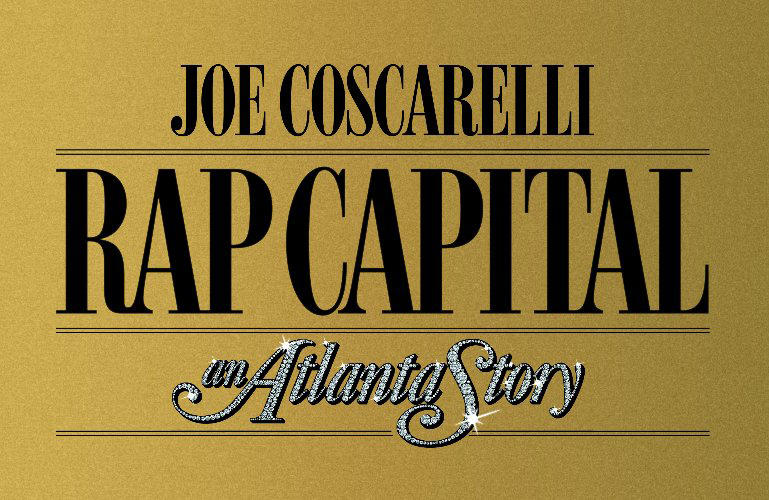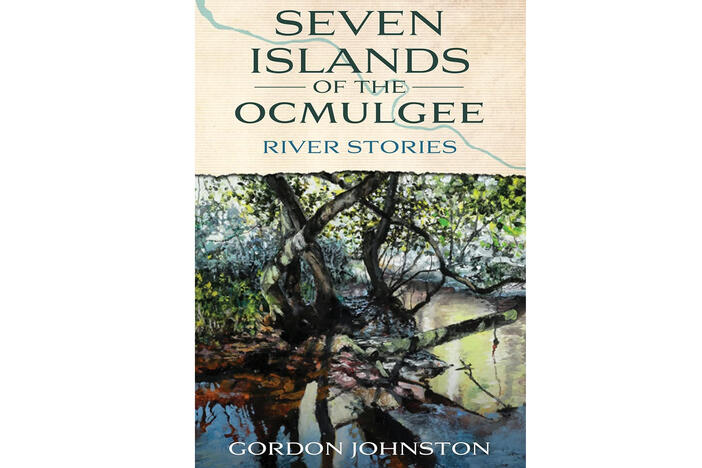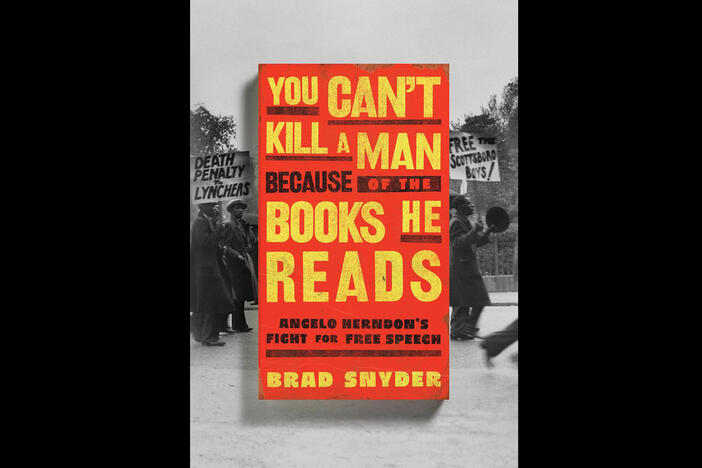
Section Branding
Header Content
Joe Coscarelli's Rap Capital: An Atlanta Story
Primary Content
LISTEN: Some of the most popular music in the world has roots in Atlanta. In "Rap Capital: An Atlanta Story," author Joe Coscarelli chronicles what it's like to be a rapper in Atlanta today and puts on spotlight on artists such as Migos and Lil Baby. After a discussion with Coscarelli, Peter and Orlando share some of their thoughts and insights on "Rap Capital: An Atlanta Story."

Orlando Montoya: Coming up in this episode:
Peter Biello: Rap Capital really, really chronicling what it's like to be a rapper here in Atlanta today.
Author Joe Coscarelli: They're always laying low and plotting in the background, taking their time, developing artists who then might be able to sort of bum rush the mainstream.
Orlando Montoya: Who is this guy Coscarelli coming down to Atlanta? And how is he getting, you know, all in with people's business down here?
Peter Biello: This podcast from Georgia Public Broadcasting highlights books with Georgia Connections, hosted by two of your favorite public radio book nerds, who also happen to be your hosts of All Things Considered on GPB radio. I'm Peter Biello.
Orlando Montoya: And I'm Orlando Montoya. Thanks for joining us as we introduce you to authors, their writings, and the insights behind their stories mixed with our own thoughts and ideas on just what gives these works the Narrative Edge.
Peter Biello: Orlando. How's it going?
Orlando Montoya: I'm doing great. Looking forward to some music here.
Peter Biello: Yeah, we've got music on today's narrative edge because according to Joe Coscarelli, the author of Rap Capital: An Atlanta Story, some of the most popular music in the world has roots right here in Atlanta.
Orlando Montoya: You don't say so.
Peter Biello: No, it's absolutely true. I mean, do you have any favorite Atlanta rappers, Orlando?
Orlando Montoya: I mean, I know the big ones. You know, Ludacris and, you know, Outkast. The big ones.
Peter Biello: Yeah. I had never really, like, thought about where the rappers I like came from, though. I you know, I'm big fan of Chance the Rapper. He's out from Chicago. And then Biggie, of course, from Brooklyn. Snoop Dogg from California. But I mean, Atlanta's dominating the scene right now.
Orlando Montoya: And we're both — we're both indicating our age with these names.
Peter Biello: I know, right?
Orlando Montoya: All the young people are like, who they are? Who are these?
Peter Biello: I definitely grew up listening to Puff Daddy when he was still Puff Daddy. But yeah. But yeah, Atlanta is huge right now. People like Lil Baby, Gucci Mane, these names are ringing a bell. Yes.
Orlando Montoya: Yeah.
Peter Biello: Yeah. Of course. Lil Nas X, Migos, Of course. GPB listeners may have heard a lot about Migos because of the murder of Takeoff late last year. We've been following that story in our newscasts. Orlando, you know their song, "Versace," right?
Orlando Montoya: Mmmmm....play it for me.
Migos - Versace: Song clip
Peter Biello: So Versace, Versace, Versace, Versace. Yeah, but that's — I mean.
Orlando Montoya: It's got some energy.
Peter Biello: Yeah, that definitely has some energy. I mean, that's part of why they're so popular that's really resonating with people. Migos got quite a bit of ink in Coscarelli book because in the past decade they've been so central to the Atlanta scene, they've lifted up a lot of people along with their rise. So, yeah, Rap Capital really, really chronicling what it's like to be a rapper here in Atlanta today.
Orlando Montoya: Is this like the first, the sort of encyclopedic kind of take on Atlanta rap?
Peter Biello: Actually, no. It is not necessarily a history of Atlanta rap. I mean, it would have to mention Outkast and spend a lot of time on Outkast, but really just mentions Outkast a little bit, but then moves forward from — from there to more present day stuff like, OK, let me back up. Have you ever seen that documentary Hoop Dreams?
Orlando Montoya: Fraid not.
Peter Biello: Okay. So Hoop Dreams was a documentary in the 1990s, basically following two kids as they chase these dreams of becoming professional basketball players.
Orlando Montoya: I kind of remember that now.
Peter Biello: Yeah. Joe Coscarelli wanted to do that in Rap Capital for rappers hoping to make it big in Atlanta.
Orlando Montoya: And so who did he follow?
Peter Biello: A young man known as Dominique Jones, who we know popularly as Lil Baby. Let's pause for a moment and listen to some of his music.
Lil Baby - A-Town: Song clip
Peter Biello: Here's Joe Coscarelli talking about Lil Baby.
Author Joe Coscarelli: Lil Baby is someone I met through my reporting at the New York Times in late 2017. He was a sort of underground mixtape artist who was just starting — starting to bubble up a bit with a few regional hits that were getting big online on YouTube among tastemakers. And I just had the good fortune of, of going down. I was writing about his record label, which had already made stars out of acts like Migos and Lil Yachty and I met this kid, Dominique Jones. He'd barely been out of prison for two years, but he'd already put out a ton of music and I just saw him improving very quickly. He was playing some of his new songs for me in the studio, and I was just blown away by his talent and also what he represented as someone sort of with one foot in the music world and one foot in what he and his friends call the streets. He had gone to jail for for drugs and weapons possession. And he was really dedicated to changing his life. But he also wasn't fully convinced that that could happen through music.
Orlando Montoya: You know, my question would be, you know, who is this guy Coscarelli coming down to Atlanta and how is he getting, you know, all in with people's business down here?
Peter Biello: I got to say, I'm so impressed with the kind of work that he's done. He's a journalist for The New York Times, and the Times kind of gave him the space to stay in Atlanta for quite a long time, over a period of many years to to follow these these people around and also build their trust.
Orlando Montoya: You got to develop relationships.
Peter Biello: Yeah, he was hanging around a lot with with Lil Baby and a variety of other — I mean, he interviewed Lil Baby's mother. Her conversations with Coscarelli feature prominently in this book, and one of the places he was actually able to hang out at a lot was Quality Control Records, which is one of the institutions that makes the Atlanta rap scene what it is. It's run by Kevin Lee and Pierre Thomas or Coach K and P, respectively.
Orlando Montoya: I remember when they were sold or something recently, they got lots of money. They were pretty big.
Peter Biello: Oh yeah, that was huge news, right? But for — for years they have been sort of an incubator of rap talent here in Atlanta. Joe Coscarelli just referenced that, that, you know, Lil Baby was kind of hanging out there, seeing the rise of Migos and saying, "hey, you know, this is possible for some people. Is it possible for me? I don't know." Another thing that Quality Control Records often did was, you know, be an outlet for people like Lil Baby to get out of the dangerous drug business so that they can focus on music. So they're really nurturing talent. Here's Joe Coscarelli's take on Quality Control.
Author Joe Coscarelli: Quality Control is always scouting new artists. One of the things I really focused on in the book was that there they're constantly building a farm team. They're not necessarily going after someone with a viral hit and then signing them. They're really in the old-fashioned business of artist development. They have a few young women on the roster who I think are quite impressive. Someone like Lakeyah. They've ventured outside of Atlanta. There's a couple — a handful of Detroit rappers from another, you know, extremely hot scene over the last couple of years that they've brought in into the fold. And I think that they're they're always laying low and plotting in the background, taking their time, developing artists who then might be able to sort of bum rush the mainstream. And I think I would never count them out given how many times they've succeeded at that thus far.
Orlando Montoya: Now, when you talk about, you know, rappers coming from Detroit and from L.A. and all the — all over the place, you know, this company could have come from all over the place, too Quality Control. But why Atlanta?
Peter Biello: Certainly companies like this could exist anywhere and do exist in a lot of places. But Joe Coscarelli was telling me exactly why he thinks Atlanta is uniquely positioned to be an incubator of this type of music.
Author Joe Coscarelli: I think because it's such a unique place in America. It's this place of collision. It's the South, but it's, you know, it has this reputation as a Black mecca. It's a transportation hub. And it which we've seen in the news over the last few weeks, it's also the place that has the highest level of income inequality in the nation. And I think Atlanta really needs both sides: the shiny side, the Fortune 500 companies; the, you know, rising Black upper middle class; historically Black colleges, universities, churches. It has — it has that side. And then it also has this underground. And that's where a lot of this music that's known as trap, which, you know, focuses on on the trade of drugs, the sale, production and use of illicit drugs, that — that also comes into play in Atlanta. And I think it's the clash of those two things that have really made it such a vibrant creative mecca.
Orlando Montoya: So there's all this clash, there's all this potential. Some rappers get very, very big, but obviously for every big rapper there's probably 10, 20, I don't know how many other ones that don't make it.
Peter Biello: Yeah, I would love to know the ratio on that, right? For every Lil Baby, there's how many people whose names we will never know.
Orlando Montoya: Does he talk about those people?
Peter Biello: Actually, he does, yeah. I mean, he picked a couple of people to follow, and one of those was a guy named Lil Reek. Lil Reek has this small stature. He kind of looks like an overgrown child. But on Instagram, he's releasing singles, putting out stuff that sounds like the stuff Quality Control is putting out. He's — he's got the image, right? He's flashing weapons and stacks of twenties on on Instagram. But, you know, it, just for whatever reason it's just — it's not catching on. But I did appreciate that Coscarelli was able to show both sides, right? Like what happens to the success? What happens to you and your family when you are able to come out of a difficult situation, like a lot of these rappers come out of Bankhead on the west side of Atlanta, which is known for its poverty. It's a difficult situation. And rappers, if they hit big, can — can climb out of that and bring their people with them.
Orlando Montoya: Well, this has been terribly interesting. I want to read more about it. That's Rap Capital, Peter. Rap Capital: An Atlanta Story. Thank you for telling me about it.
Peter Biello: Of course. And also, if it's in the bookstore, look for the book with the blinged-out gold cover.
Orlando Montoya: Thanks for listening to Narrative Edge. We'll be back in two weeks with a brand-new episode. This podcast is a production of Georgia Public Broadcasting. Find us online at GPB.org/NarrativeEdge.
Peter Biello: You can also catch us on the Daily GPB News podcast, Georgia Today, for a concise update on the latest news in Georgia. For more on that and all of our podcasts, go to GPB.org/podcasts.
Some of the most popular music in the world has roots in Atlanta. In Rap Capital: An Atlanta Story, author Joe Coscarelli chronicles what it's like to be a rapper in Atlanta today and puts on spotlight on artists such as Migos and Lil Baby. After a discussion with Coscarelli, Peter and Orlando share some of their thoughts and insights on Rap Capital: An Atlanta Story.







